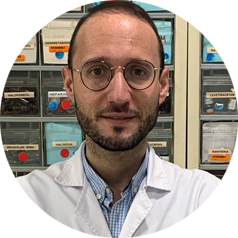Javier Cornago Navascués
Quirónsalud Training Stay Scholarship


November 21, 2022
"The development of increasingly sensitive diagnostic techniques and the identification of new mechanisms that serve as therapeutic targets are essential for the advancement in the management of patients with hematological cancer. Without research, there is no possible future."
— Dr. Javier Cornago Navascués
Dr. Javier Cornago Navascués graduated in Medicine from the Complutense University of Madrid. During his undergraduate studies, he undertook several clinical and research internships in various internationally recognized units, including the Hospital San Juan de Dios (Colombia), Aarhus University Hospital (Denmark), and Wanfang Hospital (Taiwan).
He then completed his residency in Hematology and Hemotherapy at the Hospital Universitario de La Princesa in Madrid, receiving an honorary mention upon completion. During his training, he served as a resident representative on the National Commission for his specialty in the Ministry of Health.
After finishing his residency, he began his professional career at the Hospital Universitario Rey Juan Carlos (Móstoles), later joining the Hospital Universitario Fundación Jiménez Díaz (HUFJD) in August 2018, where he has been providing care ever since. He is a member of the Clinical Hematology group within the Cancer Department at the Instituto de Investigación Sanitaria Fundación Jiménez Díaz (IIS-FJD) and a faculty collaborator at the Universidad Autónoma de Madrid.
His main areas of scientific interest are hematopoietic progenitor cell transplantation and acute leukemia. He completed the Hematopoietic Transplantation Master's program in its 2nd edition (2018-2019), as well as the expert course in CAR-T therapies for hematologists and hospital pharmacists, both at the University of Valencia (UV). He has also participated as a principal investigator or sub-investigator in multiple national and international multicenter clinical trials, as well as in the publication of scientific articles and the writing of book chapters.
He is the coordinator of the Hematology Department’s nutritional and functional assessment program for patients with hematologic cancer (RHeNutrir), a member of the Clinical Practice and Care Appropriateness Commission (CAPAC) at HUFJD, and the patient safety officer in his department. Furthermore, he is an active member of the scientific societies in his specialty in Madrid, Spain, and Europe, and serves as a representative of young hematologists on the board of the Asociación Madrileña de Hematología y Hemoterapia (AMHH).
Project Summary and Clinical Relevance
Project: Clinical Immersion in the Advanced Therapy Unit with CAR-T Cells.
Adult patients with certain types of aggressive lymphomas (diffuse large B-cell lymphoma, mediastinal lymphoma) or those with acute lymphoblastic leukemia in patients under 25 years of age, who have relapsed and/or are refractory to two lines of treatment, have a global survival of less than 6 months.
In 2018, the use of cell therapy based on CAR-T cells (chimeric antigen receptor T lymphocytes) was approved for this indication. These are T lymphocytes from the patient's own body, modified by the incorporation of genetic material via a viral vector, enabling them to recognize tumor antigens and specifically destroy malignant cells.
Studies conducted to obtain approval for this therapy reported overall response rates >50%, with 40% achieving complete responses, and 60% of patients maintaining their response for more than 12 months. As a result, this procedure has emerged as a promising therapy for this group of patients. Since then, numerous clinical trials have been launched to expand its indications and increase its availability.
The main complications in the clinical management of patients treated with CAR-T therapy are cytokine release syndrome and neurotoxicity. Although these complications can sometimes become quite severe, an increasing number of protocols have allowed for early diagnosis, classification, and the implementation of effective treatments. Other relevant issues include the need for bridging therapy between lymphapheresis and CAR-T infusion, infectious complications, and mechanisms of senescence and subsequent relapse.
Thus, Dr. Cornago will undertake a rotation at the CAR-T unit at the Hospital Universitario Vall d’Hebrón, directed by Dr. Pere Barba, a nationally recognized and prestigious unit. According to Dr. Cornago, "thanks to this clinical rotation, we will be able to acquire hands-on experience in the clinical management of these therapies, which will later be applied to patients treated with cell therapy at the Hospital Universitario Fundación Jiménez Díaz."



